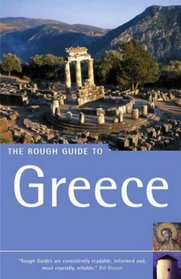Search -
The Rough Guide to Greece - 10th edition
The Rough Guide to Greece - 10th edition
Author:
Introduction to Greece With well over a hundred inhabited islands and a territory that stretches from the south Aegean sea to the Balkan countries, Greece offers enough to fill months of travel. The historic sites span four millennia, encompassing both the legendary and the obscure, where a visit can still seem like a personal discovery. Beache... more »
Author:
Introduction to Greece With well over a hundred inhabited islands and a territory that stretches from the south Aegean sea to the Balkan countries, Greece offers enough to fill months of travel. The historic sites span four millennia, encompassing both the legendary and the obscure, where a visit can still seem like a personal discovery. Beache... more »
ISBN-13: 9781843532514
ISBN-10: 1843532514
Publication Date: 8/16/2004
Pages: 1,168
Rating: ?
ISBN-10: 1843532514
Publication Date: 8/16/2004
Pages: 1,168
Rating: ?
0 stars, based on 0 rating
Publisher: Rough Guides Limited
Book Type: Paperback
Members Wishing: 0
Reviews: Amazon | Write a Review
Book Type: Paperback
Members Wishing: 0
Reviews: Amazon | Write a Review
Genres:
- Travel >> Europe >> Greece >> General
- Travel >> Guidebook Series >> Rough Guide




